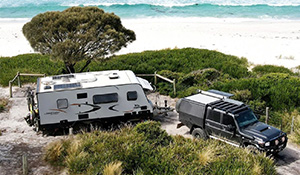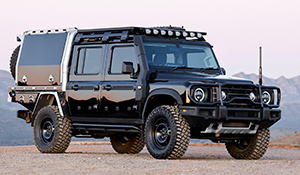ROAD TEST - 2023 Mahindra Scorpio
Words & Photos: via PracticalMotoring.com.au
A good car at a good price or a good car and it’s a good price? We find out what separates Mahindra’s new Scorpio from an intriguing competitor set.
Never heard of Mahindra? Well, you haven’t been living under a rock if you haven’t. Unless you’ve been operating farm machinery, the Indian car and tractor manufacturing giant is a largely unknown name in Australia, especially in our cities. But if Mahindra's current revolution is a success, you may well be seeing its badge in plenty of urban Aussie driveways.

Two New
They may be a new name to some in the Australian market, but Mahindra aren’t new to car manufacturing, or the Aussie market, for that matter. They've been selling the rather basic but competitively priced ‘Pik-Up’ ute here for more than a decade. Despite being available locally since 2008, the Pik-Up only offered the option of a six-speed auto this year, which in the auto world is glacial in terms of development pace, but the brand is now rapidly reinventing itself.
A new brand identity has been recently launched and the first (much more polished than the Pik-Up) models to fall under this are a pair of full-size, three-row SUVs; the ‘Scorpio’ featured here and the coming ‘XUV700’.

The main factor differentiating the two is that the Scorpio is a proper 4×4 on a ladder chassis. It also has a low-range transfer box and mechanical rear diff, plus real-world, useable ground clearance and short overhangs which means it doesn’t get hooked up on tricky dips. The XUV700 is not going to keep up with that off the road, but it will be a touch more polished over speed bumps and other obstacles on the school run. That’s not to say the Scorpio lacks polish in its on-road manners, but we’ll touch on that a bit later.
As far as competitors, the Scorpio (which drops the ‘N’ from the end of the name here due to a clash with Mitsubishi’s defunct Scorpion trademark) is classed as a large SUV, despite being a little shorter than the likes of the Mitsubishi Pajero Sport, Ford Everest, and Toyota Landcruiser Prado at 4662mm long. But due to its tall 1857mm height, the Scorpio is technically (in cubic metres) sized as a Large SUV.
A little less metal gives Mahindra wiggle room on pricing which easily undercuts all rivals in this segment. Two grades of the Scorpio will be offered locally: Z8 and Z8L, with introductory drive away pricing of $41,990 and $44,900, respectively.

Scorpio Spec
Let’s get down to brass tacks on equipment and why the Scorpio’s price is cut down that little bit more. There’s no AEB or lane-keeping systems - for now. We expect they will come in 2025 with a facelifted model that goes to ANCAP for testing.
As it is, the Scorpio scored a full five stars in Global NCAP testing in 2022 for adult occupancy and three stars for child occupant protection. That was with two airbags, whereas the Australian version has six (including curtain airbags). The lack of a three-pointed seatbelt for the middle seat limited the child occupant rating but that’s not an issue given there isn’t a middle seat in our version. In current specification the Scorpio would score lowly in ANCAP due to a lack of active safety systems, but structurally it is proven to be a very safe car.
The introduction of AEB and other active safety systems will have to see a price rise, so right now, those who are not fussed will be getting a sharp deal. It will be interesting to see if the lack of active safety tech is much of an impediment to sales once they kick off (scheduled for late April at time of writing).
Elsewhere, the Scorpio’s specification is high: 18-inch alloys with a full-size spare, bi-LED headlights, LED DRLs and fog lights, and slick sequential indicators. Inside, there’s “coffee-colour’” leather trim, an 8.0-inch touchscreen infotainment system with Apple CarPlay and Android Auto, plus USB-A and USB-C charging ports.

All of this is standard on both model grades, while the top-spec Z8L adds wireless phone charging, wireless Apple CarPlay and Android Auto, electric driver seat adjustment, a larger 7.0-inch screen in the driver’s cluster (over the 4.2-inch unit in the Z8) and a thumping 12-speaker Sony sound system, including sub-woofer.
The cabin feels well put together, with large plastic areas disguised around more detailed trim elements. The switchgear doesn’t look or feel chintzy and the touchscreen works well. The reversing camera could be higher res, but it has guides and the Z8L adds a front camera, which is handy.
In terms of seating, the second-row benefits from a similar look and feel as the front seats, while in the very back, the third-row is pretty cramped for adults but kids will get by. There are no charging ports in the third row, either.
The gripe with the interior space is that, with all three rows up, boot space is miniscule and the tailgate swings open on vertical hinge instead of a top hinge - a potential pain in tight car parks. But the third-row tumbles up to make a much better boot space, and with what looks like two torx screws on each floor bracket, they could be easily removed if not required. That would really open up the boot space, but bear in mind that payload capacity is 525kg.
Beyond the 4662mm length mentioned earlier, the Scorpio’s other dimensions include a width of 1917mm, height of 1857mm and wheelbase of 2750mm, while kerb weight is 2085kg and GVM 2610kg.

Diesel Motivation, Off-Road Exploration
Motivating the Scorpio is a 2.2-litre ‘mHawk’ turbo diesel four-cylinder engine, which is of the same type and capacity as the engine in the current Pik-Up, but maximum outputs are increased from 103kW and 320Nm to 129kW and 400Nm. Listed combined fuel consumption is 7.2lt/100km, with average range in the region of 800km from the 57-litre tank, based on the official data – 792km, to be precise.
The 2.2 diesel sends power through an Aisin six-speed automatic transmission, which in both grades is mated to a rear-wheel driven mechanical differential with a four-wheel-drive transfer case and front electronic differential. Four-high can be engaged at speeds up to 80km/h, while four-low requires the vehicle to be stationary and in neutral. Mahindra calls its four-wheel drive traction system ‘4XPLOR’ and it has Sand, Mud, Snow and Normal modes. Select one of these on the move and it will also automatically go into four-high if you aren't there already.
As far as calibration, the traction modes do noticeably change vehicle behaviour. Sand turns off traction control (very good), while Mud reduced throttle response for better traction on a slippery grass slope we tested on. The mechanical rear differential is great for added grip and will engage by itself when not in four-wheel drive. When it 'bites in,' you feel the kick.

Ground clearance of 227mm is competitive against ute-based off-roaders like Mitsubishi’s Pajero Sport, and like the Mitsubishi, the Scorpio is built on a ladder frame chassis. This gives it good clearance to the chassis rails, which combined with the 27.2-degree approach, 21.3-degree departure and 23.5-degree breakover angles, makes for a very capable off-roader.
Of all the terrains and obstacles we encountered during the test, we didn’t really need to engage four-low, but replacing the standard tyres with all terrains would open up more possibilities. Hill Descent Control is solid as well, with its speed changed by using the cruise control button (up and down) to a slow crawl.
Grunt is delivered smoothly through the six-speed auto, which may seem old tech against the eight speeds of some rivals, but the Scorpio has a good set of ratios and, in all honesty, all the gears you’ll really need. Peak torque comes on from 1750rpm and there’s not a gulf of lag off the mark, despite mild-looking figures of 129kW and 400Nm. Towing capacity is rated at 2500kg braked and there’s trailer sway control, but we didn’t test this.

On the Road
Transitioning onto sealed roads, the Scorpio does not behave like the old Pik-Up. This third-generation platform is all-new and Mahindra has obviously gone to great lengths to make sure the Scorpio is a comfortable SUV around town. At the rear is a five-link setup with Watts linkage, which explains why the Mahindra has good bodyroll support yet capable off-road articulation at the same time. The front suspension is a double wishbone arrangement and the nose points into corners with assured, albeit light steering.
Ride refinement is quite good for ladder-on-frame construction, helped by the frequency selective dampers (FSD) which, in basic terms, change the strength of their damping response depending on the frequency of bumps you travel over. This was well demonstrated when we jumped in for a hot lap around a rough paddock – not usual at an SUV launch but nonetheless a revelation at how good the ride holds up when pushed beyond normal limits.
The Scorpio’s rack and pinion steering is electrically assisted with a 110A motor that’s almost overpowered, providing light steering which is less responsive at slow speed (around town some drivers do like this) but has more firmness when hooking up a corner at cruising speed. Off-road, we felt like the wheels were easy to place, while the Z8L's front camera is a help with object detection.
Importantly noise, vibration and harshness (NVH) are not obtrusive, so this is a 4x4 you can road trip the family in and it won’t be a chore. As mentioned, there’s really good space in the front and middle rows, and we’d consider removing the rear seats if not required. This would free up a big boot space with 525kg of payload (which would increase if the last row was removed) and a boot-mounted 12v outlet, so there are some good off-grid options.

Rivals Beware
The Scorpio’s spec, performance and handling is leaning toward touring and off-roading. It’s a very solid 4×4, so naturally it’s viewed as such, but it’s a good car to drive around town, too. It stands apart from smaller SUVs, like the Hyundai Tucson, Toyota Rav4 and even the Subaru Forester, which doesn’t have a real low-range box.
Large SUV competitors, for which sales of the Scorpio will be judged, are mostly equal in terms of off-road ability and features like AEB are ubiquitous in them all, but some are not as nice to cruise in town with. Either way, at under $45K drive away (at time of writing), the value of the Mahindra can’t be overlooked by any buyer wanting an affordable off-road SUV.









